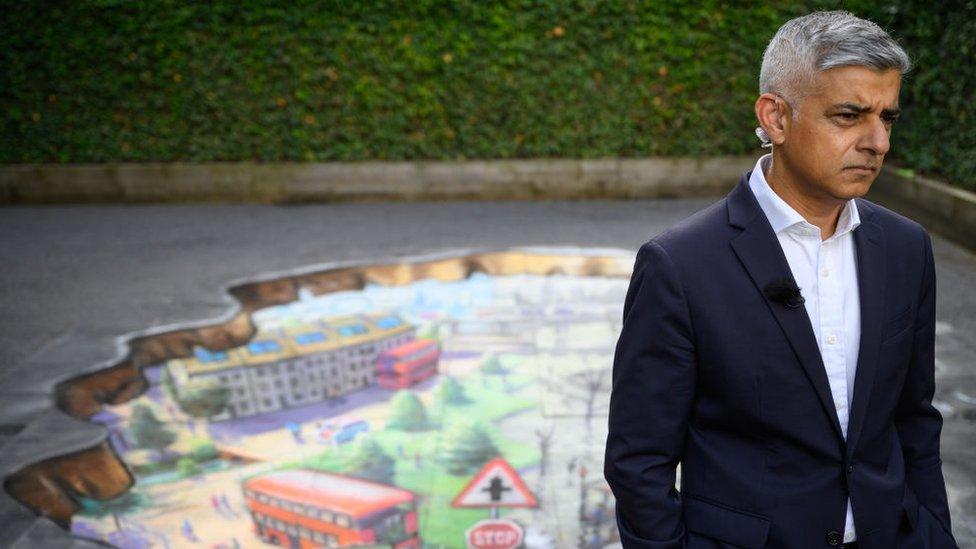Tell your party not to discredit toxic air science, PM urged
- Published
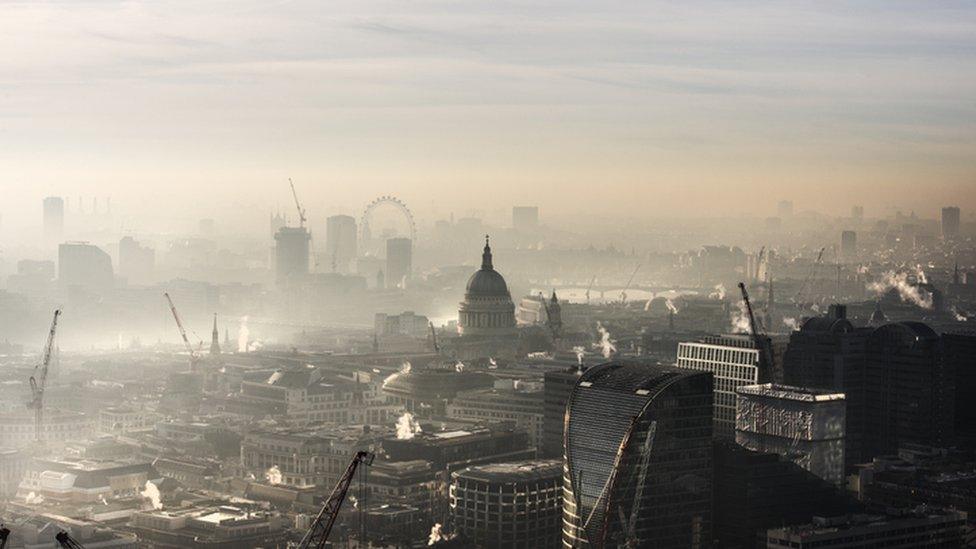
London's air quality has become a political issue
Leading scientists have urged the prime minister to "tell your party colleagues" to stop discrediting scientific facts about toxic air.
In a letter, they accuse politicians in Parliament and the London Assembly of "not believing the science".
"We ask you to join us in making the case for urgent action on air pollution," they say to Rishi Sunak.
The government said it had delivered "significant improvements" in air quality but said there is "more to do".
It comes amid controversy over Mayor of London Sadiq Khan's expansion of the Ultra Low Emission Zone (ULEZ) to also cover greater London from 29 August.
Neil Garratt AM, leader of the Conservatives at London's City Hall, said the party was committed to reducing air pollution and it was "irresponsible" to "conflate opposition to the ULEZ expansion with science denial".
The decision to charge drivers of the most polluting vehicles in outer London £12.50 a day will be subject to judicial review, the High Court has ruled.
Last month, it was revealed one in six cars registered in outer London did not meet ULEZ standards, according to figures from the Society of Motor Manufacturers and Traders.
The London mayor's office and Transport for London (TfL) have quoted different figures, saying cameras show 90% of vehicles are compliant but without providing the exact data, including the number of vehicles captured.
Mr Sunak and other Conservatives, including five councils that are taking legal action, have opposed Mr Khan's ULEZ expansion plans.
Last month, former Conservative Cabinet minister Theresa Villiers urged MPs to back a law change, which would allow ministers to intervene on decisions about transport and air quality.
Nine-year-old Ella Adoo-Kissi-Debrah, of Lewisham, south-east London was the first person in the UK to have air pollution listed as a factor in the cause of her death in 2013, at an inquest.
'Scientists have been discredited'
The letter's 36 signatories, who include Prof Frank J Kelly and Prof Marta Blangiardo, of Imperial College London, urge Mr Sunak "to value science and understand the incredible advantages it bestows upon modern society".
They write: "Our colleagues in UK universities and institutions have uncovered the extent to which poor air quality contributes to the development of asthma, strokes, heart attacks, cancer and even dementia.
"Recently the facts have been questioned and scientists have been discredited in an attack on the very essence of our scientific community.
"Mainstream politicians have been attending rallies run by conspiracy theorists. They have been loudly repeating their dismissal of our science on social media accounts and broadcast interviews. They have spoken of not believing the science in the London Assembly and in Parliament.
"We urge you to disassociate from the merchants of doubt and, in no uncertain terms, to tell your party colleagues to not endorse them or emulate their pervasive claims that sow cynicism and undermine the factual and truth foundations of life."
The Department for Environment, Food and Rural Affairs said, nationally, emissions of fine particulate matter and nitrogen oxides down by 10% and 45% respectively.
It added that, under its plans to further reduce emissions, it will "support progress towards our legally binding targets and deliver cleaner air for all."
Mr Garratt AM, leader of City Hall Conservatives, said: "We have been clear in our commitment to reducing air pollution and tackling climate change.
"The authors of the letter ask us to disavow false claims and the individuals making them, but they do not tell us which individuals or claims.
"It is irresponsible for anyone to conflate opposition to the ULEZ expansion with science denial."
Defra has been approached for a comment but is yet to respond.

Analysis
By Tom Edwards, BBC London environment correspondent
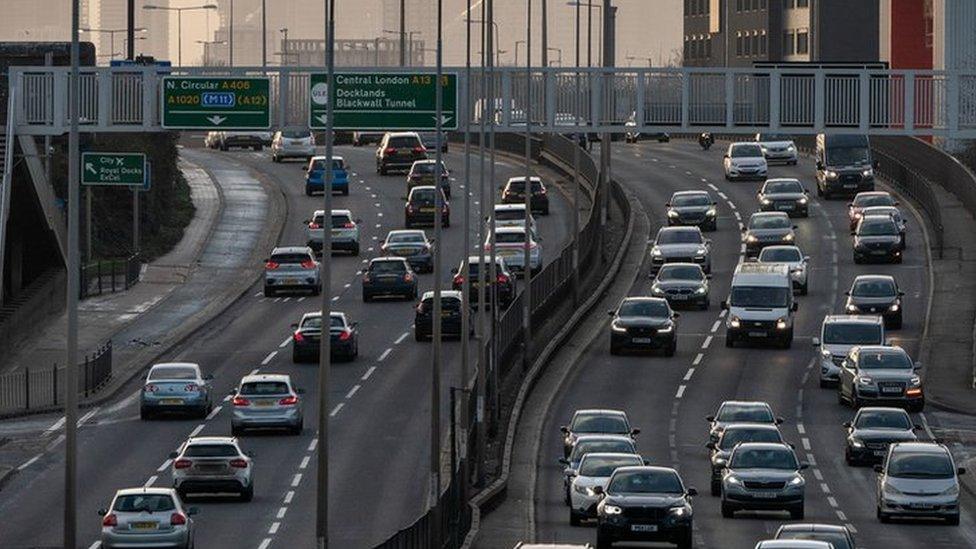
This is quite an intervention from the scientific community that doesn't normally like to get involved in politics.
These scientists are concerned that their work linking pollution to serious diseases like asthma and dementia is being dismissed in the debate over ULEZ.
The background to this is that, at the moment, there is a heated debate going on around ULEZ expansion.
There is opposition to the mayor's scheme to get older, more polluting, vehicles to pay.
Five councils are legally challenging the speed of implementation, the scrappage scheme and how effective the expanded ULEZ will be.
But the scientists are very clear that their work showing the impact that poor air quality has on health should not be up for debate and action needs to be taken on air pollution.
City Hall Conservatives have already pushed back and say it is irresponsible for anyone to conflate opposition to the ULEZ expansion with science denial.
If anything, the temperature around ULEZ seems to be increasing.

The signatories are: Prof Frank J Kelly, Imperial College London; Dr Sean Beevers, Imperial College London; Prof Marta Blangiardo, Imperial College London; Dr Henry Burridge, Imperial College London; Dr Martin Cliff, Swansea University; Prof Shenna Cruickshank, University of Manchester; Dr Dimitris Evangelopoulos, Imperial College London; Dr Gary Fuller, UKRI Clean Air Champion, Imperial College London; Dr Julia Fussell, Imperial College London; Dr David Green, Imperial College London; Prof Chris Griffiths, Queen Mary University of London; Dr Yiqun Han, Imperial College London; Prof Roy Harrison, University of Birmingham; Dr James Haydon, University of Nottingham; Prof Mathew Heal, University of Edinburgh; Prof Sir Stephen Holgate, UKRI Clean Air Champion, University of Southampton; Prof Klea Katsouyanni, Imperial College London; Prof James Lee, University of York; Dr Joseph Levermore, Imperial College London; Dr Mathew Loxham, University of Southampton; Prof Eloise Marias, University College London; Dr Mark Miller, University of Edinburgh; Dr Ian Mudway, Imperial College London; Dr Audrey de Nazelle, Imperial College London; Prof Cath Noakes, University of Leeds; Dr Paul Pfeffer, Queen Mary University of London; Prof Francis Pope, University of Birmingham; Dr Heather Price, UKRI Regional Clean Air Champion for Scotland, University of Stirling; Prof Alison Tomlin, University of Leeds; Dr Diana Varaden, Imperial College London; Dr Stephanie Wright, Imperial College London; Dr Abigail White House, Queen Mary University of London; Dr Hanbin Zhang, Imperial College London.
Three international scientists also "indicated support if their inclusion is appropriate", the letter said. They are: Prof Barbara Hoffmann, University of Duesseldorf; Prof Mark Nieuwenhuijsen, IS Global, Barcelona Institute for Global Health; Prof John Wenger, University College Cork.

Follow BBC London on Facebook, external, Twitter , externaland Instagram, external. Send your story ideas to hellobbclondon@bbc.co.uk, external
- Published1 June 2023
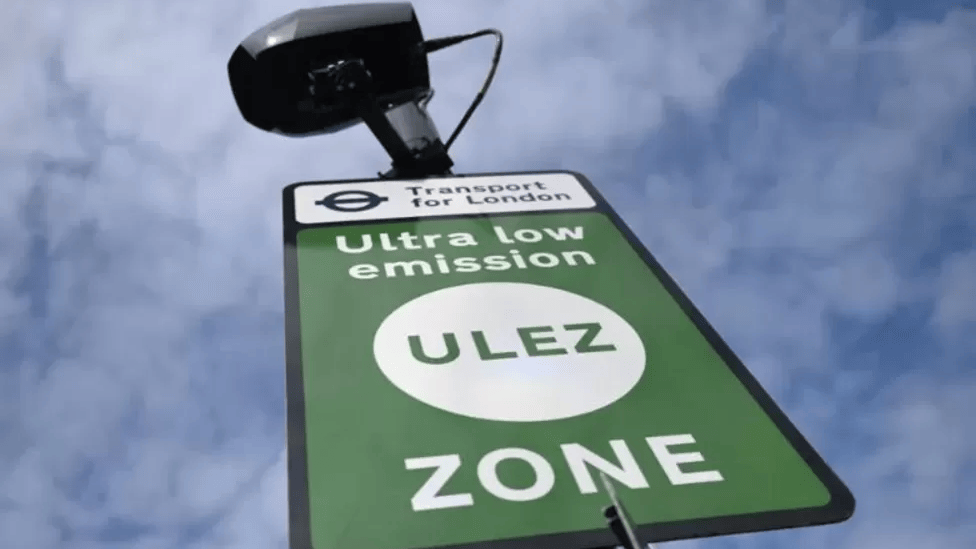
- Published4 August 2023
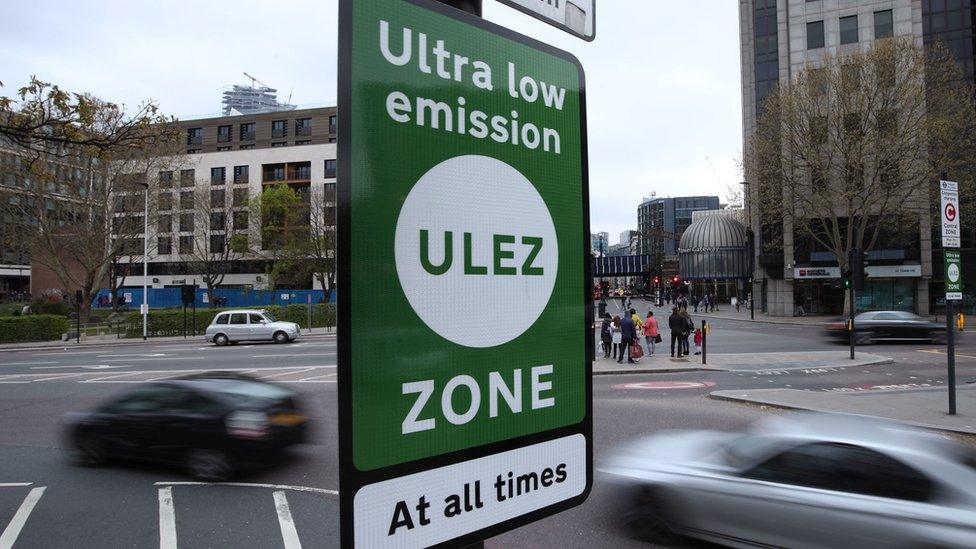
- Published18 May 2023

- Published17 January 2023
